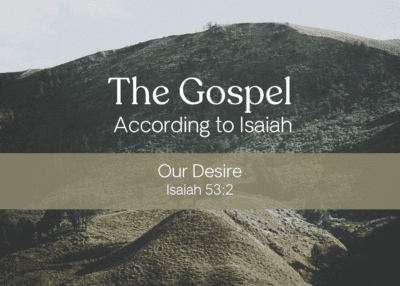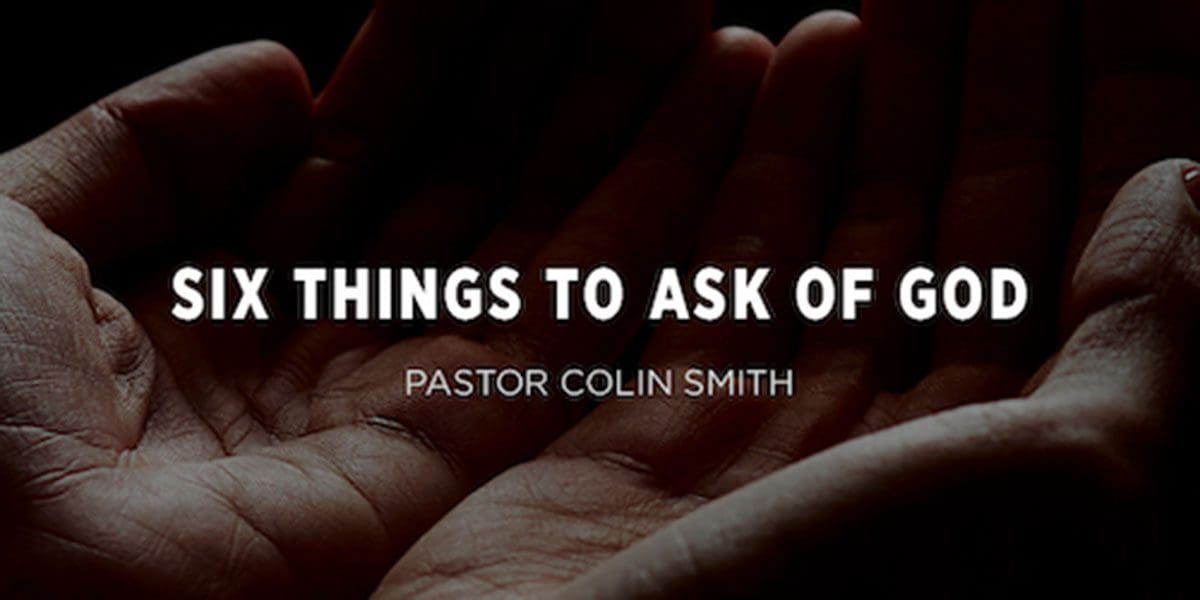Each man should give what he has decided in his heart to give, not reluctantly or under compulsion, for God loves a cheerful giver. 2 Corinthians 9:7 (NIV)
Once we grasp the freedom and joy of Christian giving, the question is—how do we decide, in our hearts, what to give? Paul’s coming to the application of his teaching, and he’s telling us what to think about when we decide what to give.
What Should I Give?
“Whoever sows sparingly will also reap sparingly, and whoever sows generously will also reap generously” (v6).
Think about your giving this way: It’s like a farmer sowing seed. The farmer has a pile of seed, and there are two things he can do with it. He can sow it in the ground. He can grind it into flour and make bread.
He is going to do both, but he has to make a decision: How much of the seed will he keep for bread? How much will he sow in the ground? Paul is using this picture to help us in the decisions we have to make about money. “Now,” he says, “here’s what you need to think about when you are deciding what to give”:
Whoever sows sparingly will also reap sparingly
Here’s farmer Joe: He is very cautious. He looks at his pile of seed and says “The winter is coming, and it’s going to be long, so I’m going to need a lot of bread. I need to keep as much seed as I possibly can.” Farmer Joe takes a small amount of seed and sows it in the field. He sows sparingly.
Whoever sows generously will also reap generously
Down the road there’s farmer Bob: He looks at his pile of seed, and says “The summer is coming and I want to have a harvest, so I need to sow as much seed as I possibly can. He keeps what he needs for the winter and sows everything else. He sows generously.
These two farmers have made different decisions about how to use their seed. Their decisions have very different outcomes. When the summer comes, the one who sowed sparingly reaps sparingly, and the one who sowed generously reaps generously.
The first thing to remember when you are deciding what to give and what to keep is that:
You will reap what you sow
It is a year later, and the two farmers come into their barns. Farmer Joe looks at his pile of seed, and says “This has been a terrible year. Winter is coming and it’s going to be long. I am going to need bread so I must keep as much seed as I possibly can.” He takes an even smaller amount of seed and sows it in the field.
Farmer Bob looks at his pile of seed and says “God has blessed me generously—this has been a wonderful year! Summer is coming and I want a harvest, so I’ll sow as much seed as I possible can.” He keeps what he needs for the winter and sows everything else.
You will sow what you reap
“Now he who supplies seed to the sower and bread for food will also supply and increase your store of seed and will enlarge the harvest of your righteousness” (v10).
God gives you money for two reasons: He gives seed to the sower and bread for food. God supplies what you need to live and what you need to give.
Think about the money God gave you this month. Think about what He has given you this year. Some of it was bread for food. It was for saving, spending, using. Some of it was seed for the sower. It was for giving, sowing, scattering. It is for helping the poor.
The question you need to decide in your heart is how you divide your seed into what you keep and what you sow. When you are thinking about that, remember—whoever sows sparingly will also reap sparingly, and whoever sows generously will also reap generously.
The one who is generous with what he is given will be trusted with more. The one who is not generous with what he is given will lose what he has. That’s the teaching here and it is wonderfully clear. But it raises an important question:
What Will I Receive?
These verses contain marvelous promises that have been horribly abused by some Christian teachers. I say “horribly abused,” because there is a form of teaching that kills the very generosity that Paul is trying to foster in these people.
The prosperity gospel
The teaching I’m referring to here is sometimes known as “prosperity teaching,” or the “prosperity gospel,” which says that God’s wants you to prosper financially, and the way this happens is by a simple formula: The more you give the more you get.
You can see why prosperity teachers appeal to 2 Corinthians 8 and 9:
“You know the grace of our Lord Jesus Christ that though he was rich yet for your sakes he became poor, so that you through his poverty might become rich” (8:9).
“You will be made rich in every way…” (9:11).
“There you are,” they say, “God wants you rich!” I have a book called “God Wants You Rich: And Other Enticing Doctrines.” A good salesman can make this sound like the sweetest deal: “You reap what you sow, so giving becomes the path to prosperity.”
A fable about a king, a gardener and a nobleman
Tim Keller tells a great story in his book “The Prodigal God.”
Once upon a time, there was a gardener who grew an enormous carrot. So he came to the palace, and said to his king “My lord, I’m a gardener, and this is the greatest carrot I’ve ever grown and ever hope to grow. Therefore, I am presenting it to you as a token of my love and respect.”
The king was touched and discerned the man’s heart. He said “I have a field that lies next to yours. I give this field to you so that you can farm it along with your own.” The gardener went home rejoicing.
A nobleman in the court overheard this and he thought to himself “A field for a carrot!” So, the next day, he came to the king with a magnificent stallion: “I breed horses,” he said “and this is the finest horse I have ever bred or ever will breed, so I am presenting it to you as a token of my love and respect.”
The king discerned his heart and said “Well, thank you very much.” The nobleman couldn’t hide his disappointment. So, the king said “Let me explain: The gardener was giving me the carrot, but you were giving yourself the horse.” [1]
When giving becomes a means of gain, generosity is impossible. One of the tragedies of prosperity teaching is that it appeals to selfishness and greed of the human heart, which thwarts the very generosity that Paul is teaching here.
Into the world of grace
Giving on the basis of law makes generosity impossible. Giving with a view to gain makes generosity impossible. We must get this whole business of giving out of the world of law and out of the world of self interest and into the world of grace where it belongs.
It’s not “The more you give, the more you get.” It’s “The more you give, the more you will be able to give:”
“You will be made rich in every way so that you can be generous on every occasion” (9:11).
If you set your heart on being more generous, God will give you an increasing capacity to do so. And as you grow in generosity, your capacity to be generous will increase:
“God is able to make all grace abound to you, so that in all things at all times, having all that you need, you will abound in every good work” (9:8).
We live in times when some of us have lost a lot of money, and many people are hoping and even praying that the stock market would give it back. If God gave you more, what would you do with it? Would it be more bread for the eater or more seed for the sower?
Here’s a question that will help to discern your heart: Do I want more so that I will have more or do I want more so that I can give more? May God prosper those who have set their hearts on generosity. Maybe a good way to pray about money is like this: “Lord, make me the kind of person who could be trusted with more.”
What is the harvest that God promises to generous people?
The Harvest of Righteousness
As it is written: ‘He has scattered abroad his gifts to the poor; his righteousness endures forever.’ He who supplies seed to the sower and bread for food will also supply and increase your store of seed and will enlarge the harvest of your righteousness” (2 Corinthians 9:9-10).
Paul makes it very clear that the harvest we are to look for is righteousness. Look at God’s wonderful promise quoted from psalm 112: “He has scattered abroad his gifts to the poor” (v9). That is a picture of lavish generosity. Here is a man who takes the seed God has given and he releases it for the good of those who are poor.
Notice what God says about this man: “His righteousness endures forever” (v9). The good that he has done will never pass away. What you spend is gone forever. What you give lives on forever.
Jesus says that if even one cup of cold water is given away, it will last forever. On the last day He will say to the righteous:
“’I was hungry and you gave me something to eat, I needed clothes and you clothed me, I was a stranger and you took me in.’ And they will say ‘When did we do this?’ Then Jesus will say ‘Whatever you did for the least of these brothers of mine, you did for me’” (Matthew 25:34-40. paraphrased)
The generosity of those who scatter gifts to the poor endures forever.
Generous giving…
…supplies the needs of God’s people
“This service that you perform is… supplying the needs of God’s people” (v12).
When God’s people give generously, the harvest is that God’s work gets done. It also raises this harvest:
…brings praise and thanksgiving to God
“Your generosity will result in thanksgiving to God” (v11).
“This service that you perform is… overflowing in many expressions of thanks to God” (v12).
“Men will praise God for the obedience that accompanies your confession of the gospel of Christ and for your generosity” (v13).
When God’s people give generously, it brings praise and thanksgiving to His Name. Jesus said, “Men will see your good deeds and give praise to your Father in heaven” (Matthew 5:16).
There is a story told of C.H. Spurgeon, the great preacher in Victorian England. He was stopped in the street by an atheist who wanted to know how Spurgeon could believe in God: “What evidence do you have for the God you believe in?
“Atheism,” the man said, “is the way of the future. It will bring humanity to its full potential.” This was at the end of the 17th century.
Spurgeon replied “How many atheist orphanages are there in London?” That was the end of the conversation. There wasn’t a single one, but there were Christian orphanages all over the city. The kindness of Christian believers is evidence of the gospel.
…deepens the bonds of love
“And in their prayers for you their hearts will go out to you, because of the surpassing grace God has given you” (2 Corinthians 9:14).
The Heart of the Gospel
“Thanks be to God for His indescribable gift” (v15)
That takes us right back to the reason we’re talking about giving this Advent season: Paul connects it to the coming of Jesus Christ. One of the first names given to our Lord is “the Seed.” You find it all the way back in Genesis 3.
In the Garden of Eden, God promised that a deliverer would come to the human race. God called him “the Seed.” God said that the Seed would crush Satan’s head, and redeem men and women taken captive by his power (Genesis 3:15).
Then God spoke to Abraham about this Seed. Through the Seed, God would raise up a great company of people who would live with joy in the land He would give to them.
Later on, Paul says “The promises were spoken to Abraham and to his seed” (Galatians 3:16). [2] Then he adds “The Scripture does not say ‘and to seeds,’ meaning many people, but ‘and to your seed,’ meaning one person, who is Christ” (v16). The Lord Jesus Christ is the promised Seed. This one seed is of supreme value.
This is a picture for us of the Seed that contains the life within it. Will this seed be kept or given? Here’s what Jesus said about His own life: “I tell you the truth, unless a kernel of wheat falls to the ground and dies, it remains only a single seed. But if it dies, it produces many seeds” (John 12:24).
God gives us THE seed. This seed is going in the ground to die. Christ says “This seed will not be kept. It will be sown in the ground.” If Christ came into the world and kept his life, he would be the greatest person who ever lived, and that would be it. He would remain a single seed, but Christ came into the world and gave his life. “The Son of God loved me and gave himself for me” (Galatians 2:20). No one ever sowed more generously.
Out of that sacrificial death, something amazing happens: The seed is multiplied. It produces many seeds. The life of Christ is transferred to millions of redeemed people through the Holy Spirit. There is a great harvest.
That harvest is exactly what Paul describes here. By giving Himself for us, Christ supplies the needs of God’s people. What is the greatest need of God’s people? Our great need is for righteousness before God, and reconciliation with God.
Christ causes our hearts to rise in praise and thanksgiving to God, so that already around the throne of God there is a community of redeemed people from every tongue and tribe and nation who love Christ and live for His glory. Even though you have not seen Him you love Him.
“Thanks be to God for His indescribable gift” (v15). When there was one seed, the Seed, God did not keep it, but He sowed it so that all who come may have eternal life. He’s saying to you today “Come, follow Me. Be like Me, sow generously, so that there might be a great harvest.”
“If Jesus Christ be God and died for me,
then no sacrifice can be too great for me to make for Him.” [3]
[1] Tim Keller, The Prodigal God, p.60, Dutton Press, 2008.
https://www.amazon.com/Prodigal-God-Recovering-Heart-Christian/dp/0525950796/
[2] This refers to the promise in Genesis 17:19.
[3] C.T. Studd
[elementor-template id=”128476″]






